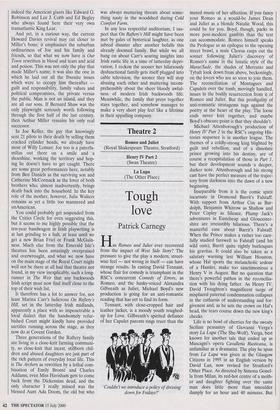Theatre 2
Romeo and Juliet (Royal Shakespeare Theatre, Stratford) Henry IV Part 2 (Swan Theatre) La Lupa (The Other Place)
Tough love
Patrick Camegy
as Romeo and Juliet ever recovered from the impact of West Side Story? The pressure to give the play a modem, street- wise feel — not wrong in itself — can have strange results. In casting David Tennant, whose flair for comedy is triumphant in the RSC's concurrent Comedy of Errors, as Romeo, and the husky-voiced Alexandra Gilbreath as Juliet, Michael Boyd's new production is going for an anti-romantic reading that has yet to find its form.
Tennant, with close-cropped hair and leather jacket, is a moody youth roughed- up for Love. Gilbreath's spirited defiance of her Capulet parents rings truer than the 'Couldn't we introduce a policy of dressing down for Fridays?' muted music of her affection. If you fancy your Romeo as a would-be James Dean and Juliet as a blonde Natalie Wood, this could be for you. Boyd, though, packs in more post-modern gambits than the text can accommodate. Romeo himself speaks the Prologue as an epilogue to the opening street brawl, a male Chorus rasps out the sonnet following Juliet's discovery of Romeo's name in the lunatic style of the MaratISade, the shades of Mercutio and Tybalt look down from above, beckoningly, on the lovers who are so soon to join them. The reconciliation of Montagues and Capulets over the tomb, movingly handled, issues in the bodily resurrection from it of Romeo and Juliet. But this prodigality of anti-romantic stratagems tugs against the poetry at the heart of the play. The loose ends never knit together, and maybe Boyd's obscure point is that they shouldn't.
Michael Attenborough's production of Henry IV Part 2 in the RSC's ongoing His- tories sequence is in another league. The themes of a coldly-strong king blighted by guilt and rebellion, and of a dissolute prince growing into his destiny, are of course a recapitulation of those in Part I, but their development sounds a deeper, darker note. Attenborough and his strong cast have the perfect measure of the trajec- tory from darkness into the dawn of a new beginning.
Inseparable from it is the comic spirit incarnate in Desmond Barrit's Falstaff. With support from Arthur Cox as Bar- dolph, Benjamin Whitrow as Shallow and Peter Copley as Silence, Plump Jack's adventures in Eastcheap and Gloucester- shire are irresistibly hilarious. There's a masterful ease about Barrit's Falstaff. When the Prince makes a rather too care- fully studied farewell to Falstaff (and his wild oats), Barrit quite rightly burlesques his gravitas. It could also be taken as a salutary warning lest William Houston, whose Hal sports the melancholic ardour of a Hamlet, make too sanctimonious a Henry V in August. But no question that there's powerful pathos in the reconcilia- tion with his dying father. As Henry IV, David Troughton's magnificent surge of misplaced paternal condemnation collapses in the catharsis of understanding and for- giveness and, as he sets the crown on Hal's head, the tears course down the new king's cheeks.
Life is no bowl of cherries for the sweaty Sicilian peasantry of Giovanni Verga's story La Lupa (The She-Wolf). Verga, best known for another tale that ended up as Mascagni's opera Cavalletia Rusticana, is unfamiliar as a dramatist. The play he spun from La Lupa was given at the Glasgow Citizens in 1995 in an English version by David Lan, now revised for Stratford's Other Place. As directed by Simona Gonel- la from Milan, its red-hot centre of a moth- er and daughter fighting over the same man does little more than smoulder damply for an hour and 40 minutes. But not for want of directorial exertion. Those cherries offered to the young hulk Nanni by the mother-temptress Pina from her apron are also on display in bowls flung hither and thither about the stage, creating interminable stage-business in the efforts to retrieve the scattered fruit. Seduced by the mother, married off to the daughter, shrived by the priests, the terminally con- fused Nanni is shown the way out by his tormentor. The She-Wolf offers him an axe concealed in the bowl of water in which she's just washed her hands of the whole affair. This is the culminating directorial sin, for Verga's point is that the weapon is Nanni's own inspiration, just as the knife is Don Jose's in Carmen. Against such odds it scarcely mattered that Brid Brennan's Pina looked as though she could have been defused by a Valium, and that DecIan Con- lon's Nanni exuded about as much sexual allure as a bowl of olive pips.



























































 Previous page
Previous page